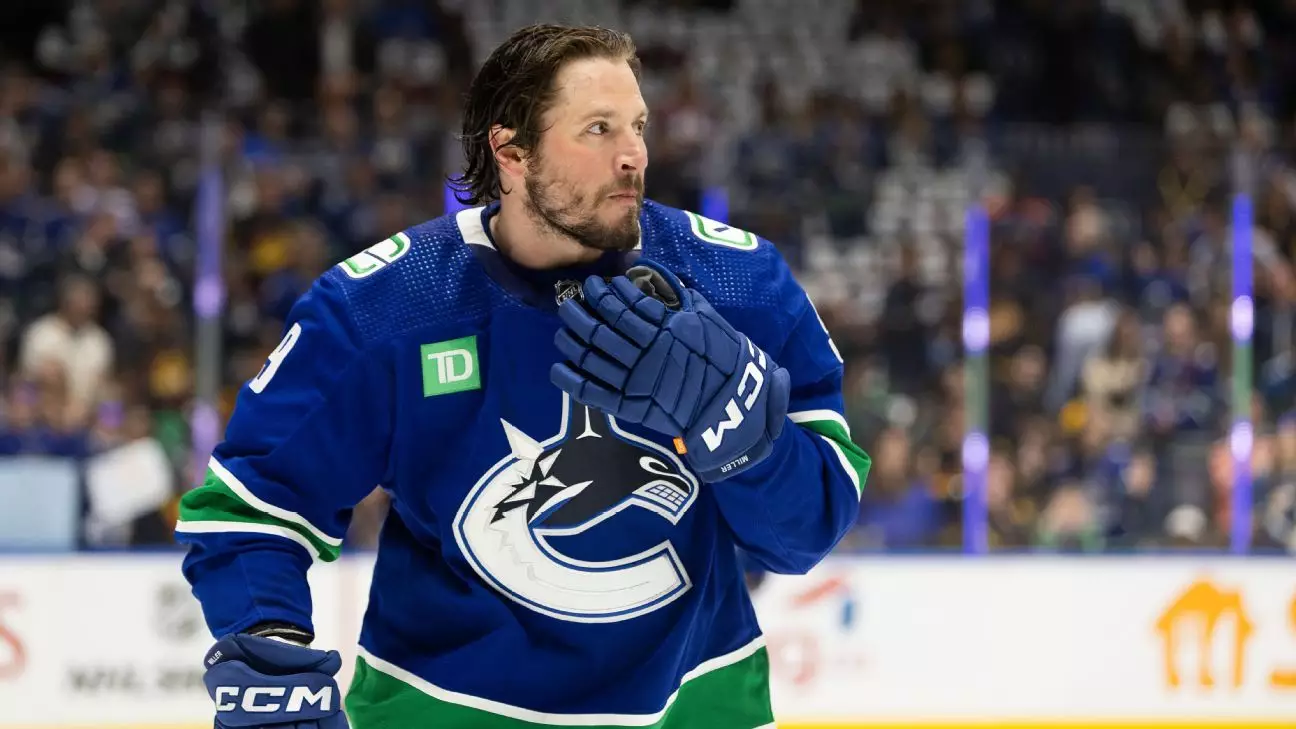The Vancouver Canucks have found themselves in a swirl of trade rumors, especially surrounding the future of forward J.T. Miller, whose name has been notably linked to a potential deal with the New York Rangers. General manager Patrik Allvin’s recent comments shed light on the ongoing discussions regarding Miller while illustrating the challenges the franchise faces in maintaining locker room harmony amid external disturbances.
Over the weekend, Sportsnet reported that the Canucks were deeply engaged in negotiations that could have seen Miller exiting Vancouver for a return to the Rangers, where he began his NHL career. Speculation suggested that the deal would involve various players and draft capital, but ultimately, it did not materialize. During a midseason press conference, Allvin chose to sidestep questions about the potential trade, opting instead to highlight his ongoing efforts to improve the team. “I’m always trying to explore how to make our team better and see if it makes sense or not,” he remarked, hinting at the complexity behind roster changes.
Miller has been a prominent figure for the Canucks since the 2019-20 season, being their leading scorer last year with an impressive 103 points. His statistics this season reflect a formidable presence on the ice, although the team’s collective performance has not reflected individual achievements, leading to discontent among fans and management alike. With a current record of 20-15-10, Vancouver finds itself on the outskirts of playoff contention—an unsettling position for a team that aims to make a significant impact.
The backdrop to the trade conversations is a lingering personal issue between J.T. Miller and Elias Pettersson, a dynamic center for the Canucks. Reports from various sources indicate that there have been tense moments in the locker room that stem from past grievances, with some attributing the difficulties to line chemistry and overall mutual frustrations. Allvin acknowledged the strain when he remarked on the emotional toll such media narratives can have on players, expressing empathy for those affected.
Miller and Pettersson’s tumultuous interaction became public knowledge when an incident at practice led to Miller reportedly labeling Pettersson as a “baby.” While both players have publicly denied any serious feud, captain Quinn Hughes has indicated that tensions exist between them. Such revelations can often destabilize a team’s morale, and it remains to be seen how both players can coexist moving forward.
Despite the gloom surrounding trade discussions and interpersonal conflicts, Allvin expressed optimism regarding the Canucks’ core group. He praised the current roster for their ability to effectively “block out the noises” from the media and continue playing competitively, as seen in their recent 3-2 victory over the Edmonton Oilers. The outcome stands as a testament to the players’ resilience, reflecting not only their competitive spirit but also the effectiveness of Coach Rick Tocchet’s leadership during a challenging season.
Tocchet, whose coaching contract includes a club option for the 2025-26 season, has garnered praise for his approach this year, even as the team grapples with problematic performances and relationship dynamics. Allvin’s confidence in Tocchet indicates that the franchise views stability in coaching as a vital element for future success. “I see him long-term,” Allvin said, reinforcing the notion that continuity in leadership is integral to fostering a winning culture.
As the Canucks strive to navigate the tumultuous waters of trade speculation and internal relationships, the focus must turn to performance on the ice. With upcoming matches, the results will shape the narrative around whether Miller will remain in Vancouver or join another franchise. His contract, averaging $8 million annually and extending through 2030, adds layers to potential trade discussions, influencing how other teams may approach the situation.
With the Canucks’ current standings placing them outside playoff qualifications, the urgency for Allvin and his management team to make impactful decisions grows. Whether that means maintaining the current roster or making significant trades to shake things up, the strategic approach must prioritize the long-term vision for the team while ensuring a harmonious locker room.
The Vancouver Canucks must tread carefully through this period of uncertainty. Balancing trade rumors, historical grievances, and performance pressures will be critical as they aim for stability and ultimately success in the ever-competitive landscape of the NHL.


Leave a Reply